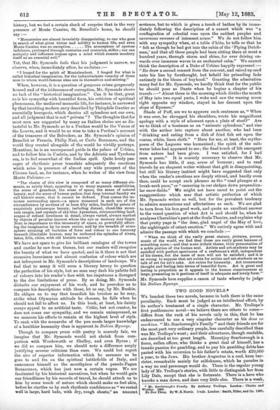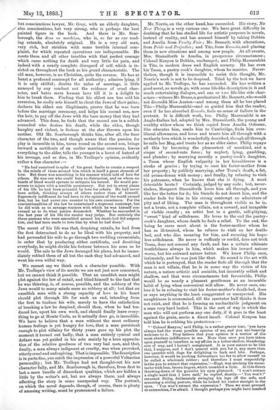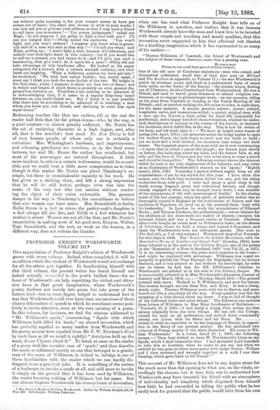TWO GOOD NOVELS.*
WE bracket these two novels, because in both there is the same peculiarity. Each must be judged as an intellectual effort, by its author's treatment of a single character. Mr. Trollope'sc first posthumous novel—we believe there are others to come— differs from the rack of his novels only in this, that he has endeavoured to use a very singular character as his &us ex- maehina. "Mr Scarborough's Family" and their friends are for' the most part very ordinary people, less carefully described than was Mr. Trollope's wont; and their adventures, though readable, are described at too great length. Mountjoy Scarborough is a fierce, sullen officer, who thinks a great deal of himself, has a lunatic passion for gambling, and to pay his gambling debts has, parted with his reversion to his father's estate, worth 020,000' a year, to the Jews. His brother Augustus is a cool, keen bar- rister, remarkable mainly for selfishness, which he parades in a way no real personage would do. There is the regular young lady of Mr. Trollope's stories, with little to distinguish her from Lily Dale, except that she is fortunate. There is a hero who knocks a man down, and does very little else. There is a weak,.
• Ns. Scarborough's Family. By Anthony Trollop°. London : Chatto and: Windns. 1883. No New Thtsg. By W. E. Norris. 3 vols. London : Smith, Elder, and Co. 1883..
bat conscientious lawyer, Mr. Grey, with an elderly daughter, also conscientious, but very strong, who is perhaps the best painted figure in the book. And there is Mr. Scar- ( borough, the dens ez machina, who is, so far as our read-
ing extends, absolutely original. He is a very old man, very rich, but stricken with some terrible internal com- plaint, for which repeated operations are indispensable. He meets them and all other troubles with that perfect courage which cares nothing for death and very little- for pain, and indeed with a nearly complete disregard of self, which is in- sisted on throughout the book as his grand characteristic. The old man, however, is no Christian, quite the reverse. He has at heart a profound contempt for all authority ; admires lying, if it is only skilful ; doubts the value of marriage, is little annoyed by any conduct not the evidence of cruel char- acter, and hates mere human laws till it is a delight to him to break them. Finding that his eldest son has sold hie reversion, he coolly sets himself to cheat the Jews of their gains ; declares his eldest son illegitimate, proves that he was born before the marriage ceremony, and helps his second son, now the heir, to pay off the Jews with the bare money that they had advanced. This done, he finds that the second son is a selfish scoundrel who desires his death, while the elder, though haughty and violent, is furious at the slur thrown upon his mother. Old Mr. Scarborough thinks him, after all, the finer character of the two, and though aware that the passion for play is incurable in him, turns round on the second son, brings forward a certificate of an earlier marriage ceremony, leaves everything to the elder, tells the younger in a burst of hatred of his revenge, and so dies, in Mr. Trollope's opinion, evidently rather a fine character :— "He bad contrived in spite of his great faults to create a respect in the minds of those around him which is itself a great element of love. But there was something in his manner which told of love for others. He was one who could hate to distraction, and on whom no bonds of blood would operate to mitigate his hatred. He would per- severe to injure with a terrible persistency. But yet in every phase of his life he had been actuated by love for others. He had never been selfish, thinking always of others rather than of himself. Supremely indifferent he had been to the opinion of the world around him, but he had never run counter to his own conscience. For the conventionalities of the law he entertained a supreme contempt, but he did wish so to arrange matters with which he was himself con- cerned as to do what justice demanded. Whether be succeeded in the last year of his life the reader may judge. But certainly the three persons who were assembled around his death-bed did respect him, and had been made to love him by what he had done."
The secret of his life was that, despising entails, he had from the first determined to do as he liked with his property, and had persuaded his wife to go through two wedding ceremonials, in order that by producing either certificate, and deceiving everybody, he might divide his fortune between his sons as he would. The sale to the Jews deranged his plans, but he imme- diately robbed them of all but the cash they had advanced, and went his own wilful way.
We cannot say we think such a character possible. With Mr. Trollope's view of its merits we are not just now concerned, but we cannot think it possible. That an unselfish man might plot against the law of entail, and blind himself to the fact that he was thieving, is, of course, possible, and the robbery of the Jews would to many minds seem no robbery at all ; but that an unselfish man with a strong capacity of love in his heart should plot through life for such an end, intending from the first to traduce his wife, merely to have the satisfaction of breaking a law he despised, should then, when he had tra- duced her, upset his own work, and should finally leave every- thing to go at Monte Carlo, as it actually does go, is incredible. We have to believe that a man without the most ordinary human feelings is yet hungry for love, that a man persistent enough to plot villainy for thirty years gave up his plot the moment it turned out badly, that a man entirely cynical and defiant was yet guided in his acts mainly by a keen apprecia- tion of the relative goodness of two very bad men, and that, finally, a man always indignant at cruelty, was when provoked, utterly cruel and unforgiving. That is impossible. The description is in parts fine, you catch the impression of a powerful Voltairian personality ; but Mr. Trollope had not thought-out his new character fully, and Mr. Scarborough is, therefore, from first to last a mere bundle of discordant qualities, which are hidden a little by the writer's art, but are always there, and always affecting the story in some unexpected way. The portrait, on which the novel depends, though, of course, there is plenty of amusing writing, must be pronounced a failure.
Mr. Norris, on the other hand, has succeeded. His story, No. New Thing, is a very curious one. We have great difficulty in doubting that he has studied life for artistic purposes in novels, instead of reality, and has amused himself by taking Dobbin and Amelia from Vanity Fair ; Mr. Bennett, with alterations,
from Pride and Prejudice; and Tito, from Romola, and placing them in new situations and among new people. At all events, Mrs. Stanniforth is Amelia, in prosperous circumstances ; Colonel Kenyon is Dobbin, unchanged ; and Philip Marescalchi is Tito, in modern dress and English scenery. He has even his Tessa, a pastry-cook's daughter, whom he marries. Never- theless, though it is impossible to resist this thought, Mr-
Norris's work is not to be despised. Tried by the test we have applied to Mr. Trollope, he has succeeded. He has written a good novel, as novels go, with some life-like description in it and much entertaining dialogue, and one or two life-like side char- acters—witness Mr. Brune, a goodnatured Mr. Bennett, who would not discredit Miss Austen—and among them all he has placed Tito—Philip Marescalchi—and so guided him that the reader, even if he has absorbed &nada, feels no sense of failure in the portrait. It is difficult work, too. Philip Marescalchi is an Anglo-Italian lad, adopted by Mrs. Stanniforth, the young and wealthy widow whom we think copied from Amelia Osborne. Sheeducates him, sends him to Cambridge, finds him over- liberal allowances, and loves and trusts him all through with a.
motherly love which is wonderfully described, though all through he calls her Meg, and treats her as an elder sister. Philip repays all this by becoming the pleasantest of mankind, and at singer of second-rate force ; by neglect, lying, gambling, and plunder ; by marrying secretly a pastry-cook's daughter, a Tessa whose English vulgarity in her loveableness is a. stroke of genius ; by trying to oust his foster-mother from her property ; by publicly marrying, after Tessa's death, a fat, old prima-donna with money ; and finally, by refusing to visit his patroness, when he knows that she is dying. A most detestable brute ? Certainly, judged by any code ; but, never- theless, Margaret Stanniforth loves him all through, and you like her the better for it; his friends do not desert him, and the reader feels for him in his strong contempt an admixture of pity and of liking. The man is throughout visible as he is, not a brute, not a complete villain, not a coward, and incapable of visible cruelty ; an artist lost in a gentle, self-pitying, "sweet" kind of selfishness. He loves to the end the pastry- cook's daughter, whose death he feels a relief. To the end, the being he cares most about is the foster-mother whom he.
has so ill-treated, whom he refuses to visit on her death. bed, and who dies moaning for him, and excusing his hope- less selfishness. He never is ruffianly or sordid, does not trick
Tessa, does not conceal any fault, and has a certain ultimate truthfulness always in him, which makes his inward nature worse, but his outward nature better. We knew Philip once, intimately, and he was just like that. So sound is the art with which he is portrayed, that the reader feels all through that the man is not villain, that he is in some way the victim of his nature, a nature artistic and amiable, but incurably selfish and shallow, and that were circumstances but favourable, Philip. would be as nearly a pleasant gentleman as an incurable habit of lying when convenient will allow. He never once, un- less it be in refusing to visit his foster-mother's death-bed, does, or says anything in the least exaggerated or unexpected. His naughtiness is economised, till the spectator half thinks it does
not exist, and that he is forming an uncharitable judgment on a man very hard bested. This is the sort of way in which the- man who will not perform any one duty, if it goes in the least against the grain, meets a direct insult. Colonel Kenyon has.
told him he is robbing his protectress :—
"'Colonel Kenyon,' said Philip, in a rather graver tone, 'you have. always had the worst possible opinion of me, and you are heartily welcome to it. Pray believe that your opinion is a matter of the, most absolute indifference to me. More than once you have taken upon yourself to interfere in my affairs in a helter-skelter, blundering sort of way, and I haven't complained. It is your nature to be like that, I suppose, and I don't quarrel with you for it, any more thaa one quarrels with dogs for delighting to bark and bite. Perhaps, however, it would be pushing forbearance too far to allow oneself to be called a wholesale robber; and therefore I must respectfully invite you to retract that expression.'—Hugh was stroking his mous- tache with lean, brown fingers, which trembled a little. At this direct throwing-down of the gauntlet his eyes glistened. I won't retract a single word that I have said,' he replied, shortly.—' You won't ?' returned Philip, deliberately swinging his legs off the sofa, and assuming a sitting posture, while he looked his visitor straight in the eyes. 'You won't retract the expression ? Then we must proceed to extremities, I'm afraid. I thought perhaps you might have insulted
sue without quite meaning it, for your temper seems to have got rather out of hand ; but, since you choose to stick to your words, I can only ask you to give me your address, so that I may send a friend to call upon you to-morrow.'—' You young jackanapes !' called out Hugh, ' do you suppose I am going to fight a duel with you ? I'll
see you hanged first P—Philip raised his eyebrows. Yon won't fight, and you won't retract ? I suppose you know what is gener- ally said of a man who acts in that way ?'—' I'll tell you what,' said Hugh, getting up ; I won't fight a duel, because it's ridiculous, and nobody ever does fight duels in this country; but if you would like to call me a coward, you had better do it—and I'll give you such a hammering, that you won't do it again for a year.'—Philip did not take advantage of this handsome offer. He looked at his angry antagonist for a minute with a certain amused curiosity, and then burst out laughing. 'What a ludicrous position we have got into !' he exclaimed. We both look rather foolish ; but, vanity apart, I must say I think you look the more foolish of the two. My height is five foot nine; yours, I suppose, is about six foot two or three; and in weight and length of reach there is probably an even greater dis- proportion between us. Therefore I see nothing to be ashamed of in acknowledging that, if it came to a regular ding-dong tussel between us, you could thrash me. But I think it is just possible that there may be something to be ashamed of in insulting a man whom you know you can thrash, and declining to meet him upon equal terms."
Redeeming touches like that are endless, till at the end the reader half feels that the fat prima-donna—who, by the way, is a good creature—is almost penalty sufficient. Mr. Norris has the art of analysing character in a high degree, and, after all, that is the novelist's first need. No New Thing is full of very human people, of whom only one is certainly a 'caricature. Mrs. Winnington's hardness, and imperiousness, and scheming greediness are overdone, as in the final scene between her and Mr. Brune the author has recollected, but most of the personages are natural throughout. A little more incident, to relieve a certain tediousness, would be accept- able, and we could bear a little more compression as to time, though in this matter Mr. Norris can plead Thackeray's ex- ample, but there is unmistakeable capacity in his work. He has given us a striking story, and left a strong impression that he will do still better, perhaps even rise into the ranks of the very few who can satirise without render- ing the object of their satire unloveable. The greatest danger in his way is Thackeray's, the nureadiness to believe that nice women can have sense. Mrs. Stanni.forth is feeble, Nellie Brune is a fool in crises, the pastry-cook's daughter is a fool always till she dies, and Edith is a fool whenever her mother is about. Women are not all like that, and Mr. Norris's impartiality in making most of his good men, Kenyon, Walter, Tom Stanniforth, and the rest, as weak as the women, in a different way, does not redeem the blunder.




































 Previous page
Previous page